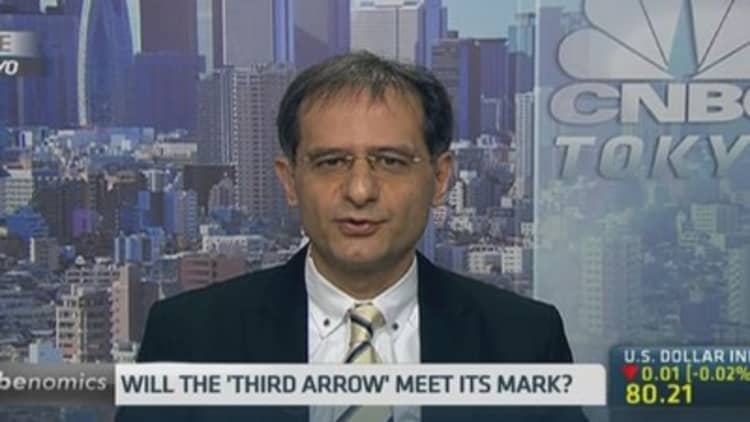
Japan's core consumer prices rose 3.4 percent in May from a year earlier, data on Friday showed, rising at their fastest pace since April 1982.
The rise in the core consumer price index (CPI), which excludes volatile food prices, was in line with analyst expectations in a Reuters poll for a 3.4 percent rise.
Read MoreJapan's Abe unveils 'Third Arrow' of reforms
Annual consumer prices in Japan have risen for 12 straight months – a positive sign for the Bank of Japan and Prime Minister Shinzo Abe's plan to finally rid the world's third biggest economy of deflation risks.
"The inflation numbers have been driven by a rise in fresh food prices and utility prices," said Glenn Levine, senior economist at Moody's Analytics in Sydney.
A slew of economic data released at the same time showed Japan's household spending fell 8 percent in May from a year earlier, compared with forecasts for a 2 percent decline.
Japan lifted its consumption tax to 8 percent from 5 percent in April – and with consumers front-loading their spending before the tax increase, consumption has fallen since then.
Other data showed Japan's retail sales fell 0.4 percent in May on-year, smaller than the 1.8 percent fall anticipated by economists polled by Reuters.
Read MoreIs Bank of Japan at risk of QE failure?
Japan's jobless rate meanwhile fell to its lowest level in over a decade and a measure of labor demand rose to its highest in two decades.
"The data, on aggregate, should be please the Bank of Japan and government," said Levine.
"The jobs data was strong and the retail sales numbers were better than expected," he said, adding that the retail sales number gives a broader picture of Japanese consumer spending trends than the household consumption data.

Japan's economy has been in the spotlight this week after Abe unveiled details of the 'third arrow' of this economic strategy to boost Japan's long-term growth prospects.
The plan calls for corporate tax cuts, a bigger role for women and foreign workers and easing regulations in areas such as agriculture and health care.
Read MoreJapan's celibacy issue-What's the economic cost?
"There are many things there that can help boost growth in the long-term so the government should now focus on implementing the third arrow," Giovanni Ganelli, a senior economist at the International Monetary Fund told CNBC on Friday.
Japan's benchmark Nikkei stock index showed little immediate reaction to the data, slipping 0.12 percent in early trade.

